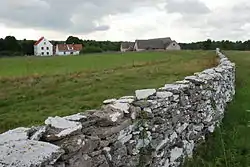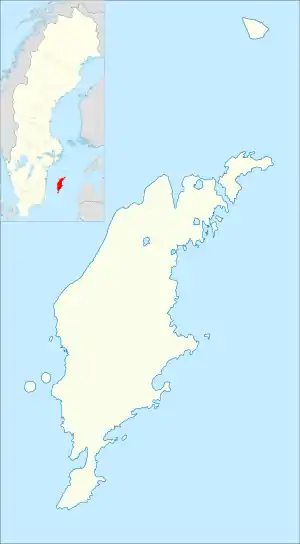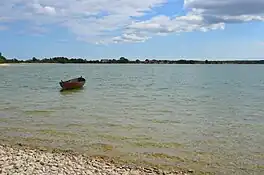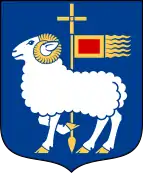Fleringe
Flairingge (Gutnish) | |
|---|---|
 West part of Hau farm in Fleringe | |
 Fleringe | |
| Coordinates: 57°52′10.66″N 18°52′37.07″E / 57.8696278°N 18.8769639°E | |
| Country | Sweden |
| Province | Gotland |
| County | Gotland County |
| Municipality | Gotland Municipality |
| Area _60.06 km2 is land[1] | |
| • Total | 69 km2 (27 sq mi) |
| Population (2014)[2] | |
| • Total | 74 |
| Time zone | UTC+1 (CET) |
| • Summer (DST) | UTC+2 (CEST) |
Fleringe is a populated area, a socken (not to be confused with parish), on the Swedish island of Gotland.[3] It comprises the same area as the administrative Fleringe District, established on 1 January 2016.[4]
Community
The name is known since 1304 as Fledynge, the first part flaidh meaning "tear or wound" is figuratively used for "hills" or "wound in the landscape", such "wounds" can be found north and northwest of the church, and the last part inge meaning "inhabitants".[5] Fleringe is situated on the north coast of the main island, Gotland, west of Fårösund and right by Lake Bästeträsk. Fleringe is mostly forested land.[1][6][7]
A number of grave mounds and stone circles from the bronze age can be found at Fleringe.[8] The medieval Fleringe Church is located in Fleringe.[9] As of 2019, Fleringe Church belongs to Bunge-Rute-Fleringe parish in Norra Gotlands pastorat, along with the churches in Bunge and Rute .[10][11]
One of the asteroids in the Asteroid belt, 9359 Fleringe, is named after this place.[12]
Limestone industry
From 1650, and peaking during the 1920s, the area around Fleringe contained many industries connected to the limestone industry on Gotland. The limestone industry closed down in 1990.[13] The old lime kiln can still be seen as a part of Bläse lime industry museum along with the old railway.[14] One of the old limestone quarries at Ar in north Fleringe is now filled with water so clear and blue it has been named the Blue Lagoon. It is a popular destination for people on the island.[15]
Lakes and research
The Lake Bästeträsk is the largest lake on Gotland. The water is very clear and shallow, with an average depth of 4.5 m (15 ft).[13][16]
The long, flat stone beaches at Ar in north Fleringe makes this an ideal location for weather and fishing research. There are two research stations at Ar, Fårösund väderstation and Fiskforskningsstationen connected to Campus Gotland and Uppsala University.[17] Sometimes these stations also hosts ornithological research.[18]
Gallery
 The Blue Lagoon at Ar, Fleringe.
The Blue Lagoon at Ar, Fleringe. Fleringe church.
Fleringe church. Flerlinge church.
Flerlinge church. Bläse harbor, Fleringe.
Bläse harbor, Fleringe. Bläse limestone industry museum, Fleringe.
Bläse limestone industry museum, Fleringe. Weather station at Ar, Fleringe.
Weather station at Ar, Fleringe. Stranden vid Ar, Fleringe.
Stranden vid Ar, Fleringe. Bästeträsk at Fleringe.
Bästeträsk at Fleringe.
References
- 1 2 Fleringe socken, Svensk Uppslagsbok (2 ed.). Malmö: Förlagshuset Norden. 1947–1955.
- ↑ "Gotland i siffror 2015" [Gotland in numbers 2015]. www.gotland.se. Gotland Municipality. Retrieved 25 May 2016.
- ↑ The exact extent of the socken, now district, can be obtained by clicking on Kartinställningar and check the Socken box in the menu of this map from the Swedish National Heritage Board database.
- ↑ "Förordning om district" [Regulation of districts] (PDF). Ministry of Finance. 17 June 2015. Retrieved 24 May 2016.
- ↑ Wahlberg, Mats (2003). Svenskt ortnamnslexikon. Uppsala: Språk- och folkminnesinstitutet (SOFI). ISBN 91-7229-020-X.
- ↑ Harlén, Hans; Harlén, Elvy (2003). Sverige från A till Ö: geografisk-historisk uppslagsbok. Stockholm: Kommentus. ISBN 91-7345-139-8.
- ↑ "FörsamlingaR". www.scb.se/sv/. Statistika sentralbyrån. Retrieved 1 June 2014.
- ↑ "Fleringe fornlämningar". www.fmis.raa.se. Riksantikvarieämbetet. Retrieved 1 June 2014.
- ↑ Lagerlöf, Erland; Svahnström, Gunnar (1973). Gotlands kyrkor [Gotland's Churches] (in Swedish). Stockholm: Rabén & Sjögren. p. 137. ISBN 91-29-41035-5. SELIBR 7232718.
- ↑ "Församlingar på Gotland". www.svenskakyrkan.se. Church of Sweden. Retrieved 11 January 2019.
- ↑ "Visby stifts indelning 2018". www.svenskakyrkan.se. Church of Sweden. Retrieved 11 January 2019.
- ↑ JPL Small-Body Database Browser on 9359 Fleringe
- 1 2 Enderborg, Bernt. "Bästeträsk". www.guteinfo.com. Guteinfo. Retrieved 1 June 2014.
- ↑ Enderborg, Bernt. "Bläse kalkbruksmuseum". www.guteinfo.com. Guteinfo. Retrieved 1 June 2014.
- ↑ Enderborg, Bernt. "Blå Lagunen". www.guteinfo.com. Guteinfo. Retrieved 1 June 2014.
- ↑ "Gotland i siffror 2013, pdf ("Gotland in numbers 2013")". www.gotland.se. Region Gotland. p. 4. Retrieved 1 June 2014.
- ↑ "Forskningsstationen Ar, Campus Gotland". www.hgo.se. Uppsala Universitet. Retrieved 1 June 2014.
- ↑ Bygren, Per G. "Utökad utrustning och forskning och tvärvetenskapliga studier via Fårösunds väderstation På Ar". kundo.se. SMHI. Retrieved 1 June 2014.
Further reading
- Westman, Anna (1988). Att bränna snö: om kvinnoliv i Fleringe (in Swedish). Lärbro: Intresseföreningen Bläse kalkbruk. SELIBR 777354.
- Pettersson, Jörgen (1987). Botanisk och ornitologisk inventering av täkt- och påverkansområde för planerat kalkbrott i sydvästra Fleringe (in Swedish). Visby: Naturvårdsfunktionen, Länsstyr. i Gotlands län. SELIBR 693128.
- Ohlsson, Erik W (2002). "Groddargården i Fleringe". Från Gutabygd. 2002: 25–34. SELIBR 9649105.
